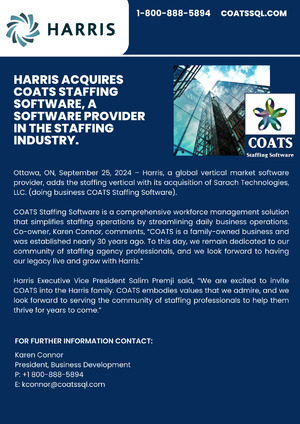Recruiters need to ask themselves the question: “How do you measure success?” By addressing this issue, the recruiter can gain insight into which of their business processes work and which do not. Using a meaningless metric can easily lead you astray and cause you to waste valuable time and resources tilting at windmills. This article will give you some ideas on metrics that are commonly used and hopefully will help you adjust your business strategy to have a more productive and profitable 2025!
Headcount, Hours & Bill Rate
For contract placements recruiters often cite the number of people they have working, or the number of hours worked, as useful metrics for success. This is fine, and you certainly want to grow these numbers, but if either the number of people or hours happens to be low, then this metric is not so useful in developing a strategy for improving the bottom line. The metric of bill rate needs to be added to this equation for it to make sense. Increasing the headcount, and the hours worked, and the bill rate will obviously result in better financial performance. Key to this calculation is knowing your payroll burden when quoting your bill rate. If you outsource your contract placements, an EOR (Employer of Record) can help you by providing a profit calculator. So, you should review how you spend your time and resources and pick the component that can most easily be increased!
Contracts, Clients & Placements
Other metrics that recruiters often cite are the number of contracts they have in place, the number of client companies, and the number of placements made. Again, increasing any of these metrics is a good thing, but try to focus on the metric that gives you the most bang for your buck. Spending time, effort, and resources on chasing a contract, or client, or placement that has a low expectation of a good return is wasteful.
Profit Earned or Profit Paid
A recruiter can cite the metric of Profit Earned and think that by growing this that they are being productive and efficient. But if the receivables are slow coming in or are proven to be uncollectable, then this metric is a false friend. Profit Paid is more useful in that it is monies actually received. The time value of money should always be considered in reviewing your business processes. With some clients extending their payment terms to 60 or even 90 days, the recruiter will pay the price for these slow receivables.
Plan Now for a Successful 2025
So, what do you do to improve your bottom line in 2025? The answer is to do your homework and make a thorough review of your metrics for 2024. Honestly appraise both the magnitude and trend for each metric and then use this as your basis for developing a strategy for the coming year. Some suggested activities for you are:
Evaluate past experiences. Look at past experiences with bids, for example. What worked and what didn’t. Try to determine what factors were involved in winning a bid and apply those tactics for the next bid opportunity. Also, you must ask yourself, was this bid worth winning? Is it a low-maintenance or high-maintenance contract? Consider the time, effort, and resources expended on the bid and make the judgement whether it was worthwhile. Your metrics will help you answer these questions.
Know your target market. A focused approach to the market may well prove to be better than a shotgun approach. Pick the market niche that you would like to serve and then become expert on it. If you happen to choose a relatively low-bill rate market, then you need to drive up your metrics for headcount and hours worked. Obviously, if you pick a high bill rate market segment, the headcount and hours worked don’t have to be as high to result in profitability. And, needless to say, the competition in this segment is going to be more aggressive! So, consider whether it is worth your while to compete for these placements.
Implement Strong Marketing. Once you have compiled and understood your metrics, evaluated how you have done in the past, and chosen your target market it is time to actively disseminate your firm’s information. Design a marketing campaign using all the available media and, most importantly, be sure to maintain the personal connection with your clients. Since many are turned off by excessive emails, texts, and the like, be thoughtful and deliberate in your marketing efforts so that you don’t make a pest of yourself and be branded a spammer!
Have all licenses and insurances in place. Chasing after a big contract is great, but if you are not ready to land the fish after it is hooked, you have wasted your time. Be aware of any licenses, contracts, insurances, or other special arrangements (such as EOR services) which are required prior to making a placement. By being proactive and anticipating the needs in advance you can smooth the path for the placement. Try to avoid creating a situation where you, your staff, and your support partners must make a mad scramble on a Friday afternoon for someone starting to work the following Monday!
Make use of any opportunity. We’ve all heard that “a good crisis should not go to waste.” The same is true for opportunities. Keep your finger on the pulse of your chosen market segment and your eyes peeled for any potential opportunity for a placement. Your marketing campaign hopefully will reveal some possibilities. A good personal relationship with your clients may also give you a boost here, since you may receive word of an upcoming need before the competition gets wind of it.
Summing it all up, you should know your metrics and how they impact your bottom line, focusing on the metric which yields the most cost-effective use of your time. You must keep current with trends in the market segment you wish to serve and market effectively to that segment. Make a habit of accessing readily available information such as the Bureau of Labor Statistics website and share what you learn with your clients. This personal connection will improve your chances of a successful placement. Lastly, carpe diem: seize the day! Act swiftly to determine if an opportunity is worth your time and effort to pursue. Don’t waste your time on unrealistic business.
If you have any questions or if I can be of help growing your business, please feel free to call me. I am always happy to help!
Judy Collins CPCC
President, Judy Collins Staffing Resources, LLC
1102 Cordillera Trace
Boerne, Texas 78006
713-858-2677
judy@jcsrllc.com
Read More by Judy Collins





